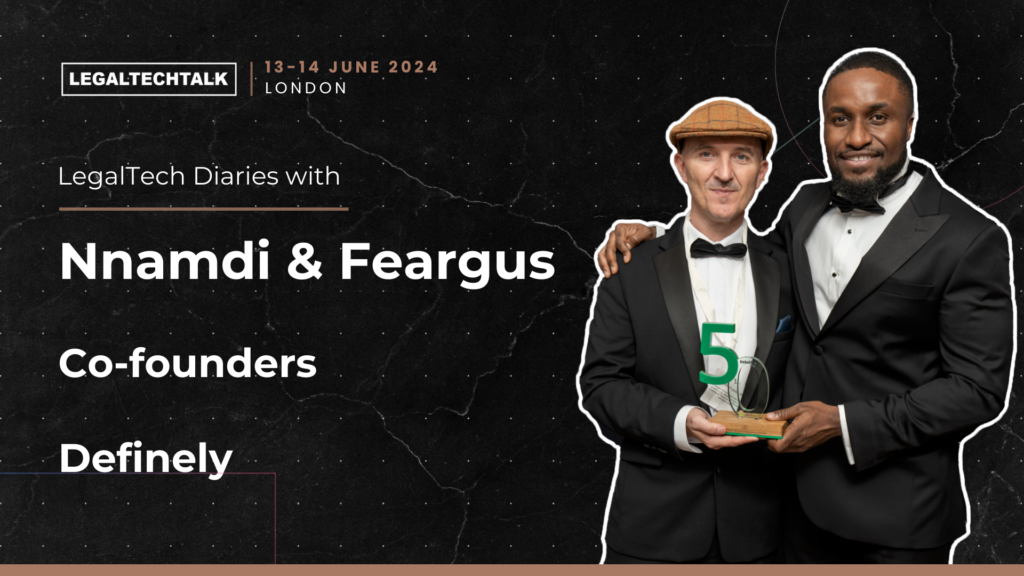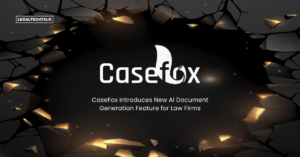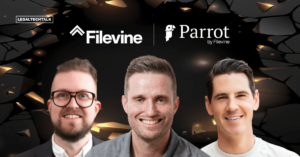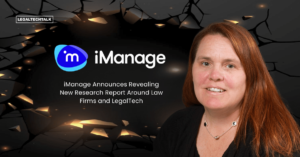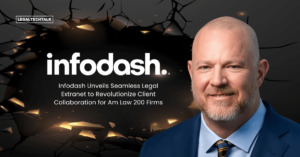In this insightful interview, Nnamdi Emelifeonwu and Feargus MacDaeid, co-founders of Definely, share their inspiring entrepreneurial journey and perspectives on legal tech adoption. Definely is a legal tech solution, a one-click tool to help lawyers draft, review, and understand complex legal documents.
The co-founders discuss challenges like the partnership model’s disincentives for long-term tech investments and billable hour pressures hindering innovation. They emphasize the need for firms to dedicate resources to evaluating and embracing technology. Looking ahead, they envision a transformative shift driven by digital natives and AI, underscoring the importance of adapting to evolving ways of interacting with data to remain competitive.
Bradley Collins: Hi Nnamdi & Feargus, a pleasure speaking with you both – I’d like to start with a question for you Feargus, I’d love to hear the backstory of why Definely was founded?
Feargus: Hi Bradley, it’s a pretty unique story of how we founded Definely, actually. Nnamdi and I met while we were both young lawyers at Freshfields. We became great friends, and Nnamdi was fascinated by how I could do the same work as he was doing (reviewing long, complex legal documents) with my visual impairment. It’s probably a good time to note that I’m registered blind.
Accessing any information for someone who is visually impaired is incredibly challenging, never mind legal documents.
I vividly remember the time in the office when Nnamdi was looking at me, going through these documents to find the meanings of defined terms and other key information, and he said, ‘Feargus, this is the 21st century; there has to be some kind of solution to solve this problem.’
That was really the genesis. Then we started thinking that for someone like me to be able to just double-click on any key information (such as a defined term) to understand its meaning as well as interact with it without leaving where I am, and therefore not lose context, would be gold.
We then put our idea into action, and when we got the first iteration of what was a very buggy prototype at the time, that was the ‘aha’ moment.
This was when we realised that it wasn’t just a tool that would help lawyers like me, but it would help all lawyers everywhere. Fast forward to today, we have some of the world’s largest law firms and multinational corporations using our products, which makes me incredibly proud.
Bradley Collins: That’s truly inspiring to hear and a great story, congratulations on everything you’ve achieved so far Feargus and kudos to you Nnamdi for being such a great friend & supporter. Nnamdi, this one’s for you, I’d love to hear how has the journey been for you in building Definely – both the highs and lows…
Nnamdi: It’s been an incredible journey where I’ve learned a lot; there have certainly been lots of highs and lots of lows, but the highs really make the lows worth it. I’ve been lucky to have an incredible team around me, and we’ve worked together to turn our vision into a reality, it’s good that this is now coming to fruition.
We’ve been fortunate to welcome some stellar customers along the way, with a lot of the world’s largest law firms & and multinational corporations, like Deloitte, Barclays, DLA Piper and Dentons, now using our suite of solutions. We’ve also moved from a single- point solution to a full suite of products and we’re the only LegalTech company that offers a fully integrated, unified solution for the pre-execution contract lifecycle.
What felt like a low at the time was having to move back home to live with my parents and leave my secure job as a lawyer at Freshfields – it really felt like a step back at the time. But with hindsight, it was one step back to take ten forward.
There have been so many highs, but some of my highlights were securing our first round of funding – this was really the first time I thought, ‘Wow, we are really building a tech company’ and the external validation that people believed in our vision was so inspiring.
Since then, other things of note include Definely being recognised as a Rising Star by TechNation, being highlighted in Sifted as one of the top 11 UK startups to watch in 2023, and most recently, being named in the Deloitte UK Technology Fast 50 as one of the fastest growing technology companies in the UK.
Bradley Collins: Congratulations on the nomination! Another question for you… where do you believe some law firms are currently falling short, and what should they be focusing on today to ensure they thrive in years to come?
Nnamdi: There is a fairly large gap between those firms embracing technology and embedding it within their workflows, those firms racing to play catch up and those that are just getting started. We believe over the next five years, that gap will widen and those firms that are set up to embrace the coming technological wave will ultimately win more business and accelerate past their peers.
There are two main issues we see that impact the ability of law firms to be more nimble with evaluating and adopting technology, both pertaining to the law firm business model.
The first sits with the partnership model, which ultimately means partners are playing lawyer, shareholder, and manager within the same company – each of which carries a different set of incentives. Partners can be disincentivised to pursue increased short-term expenditure for long-term capital gains, given the impact on PEP and reluctance by those partners who may leave the firm before those gains are realised.
The firms that overcome this the best are those that build out a strategic vision for their technology roadmap and then allocate a budget proactively for the innovation and technology teams to use to execute against that vision, as opposed to each capital expenditure being subjected to partner approval.
Secondly, the billable hour remains an obstacle for promoting testing, evaluating and rolling out software. Every minute or hour spent by a lawyer testing tools and providing their feedback has a significant opportunity cost, which needs to be paid back by that lawyer, then working later to make up that time.
Firms that allow lawyers to allocate time spent evaluating technology towards billable targets far surpass their peers in creating an internal culture of placing technology at the heart of their service delivery model.
Bradley Collins: Finally – Feargus, I’d love to hear your vision of how the legal industry will look like in the next 10-20 years – what will be the biggest shifts and changes you expect to see, and what do law firms need to be proactively doing today to prepare for this future?
Feargus: The practice and teaching of law are undergoing a transformation. There’s a shift from merely storing information to emphasising the fluidity of information. The focus is now on validating and verifying information rather than solely relying on personal interpretation or contemplating necessary changes.
The way offices and hardware have already started to change, and the rate at which they will continue to change will only increase. When you look at younger people now, having a set desk with a fixed screen, a keyboard and a mouse, it almost looks inefficient.
As AI becomes more prominent in the workplace, this process will help move along, but it will not be the full story. The real story will be the people who are digital natives, studying the way they physically interact with data and devices, as well as how they learn.
What we have to be aware of is that this generation of people thinks and interacts differently from my generation and older. If we keep holding on to the idea that ‘our way’ is correct simply because this is how it’s been for us, then we will get left behind.
We are currently moving through a phase in history that is the biggest perception shift since the invention of the internet, and our way of seeing the world and interacting with it is changing and will bring new ways of thinking and doing.
If I were looking to protect myself as a firm, I’d hire a team to study all of the junior lawyers that come into the firm and observe how they work and think so that I can adapt around that.

